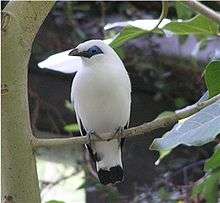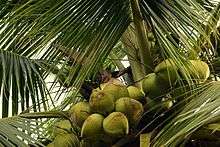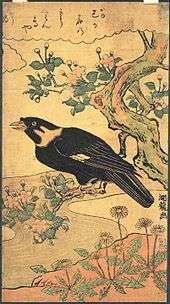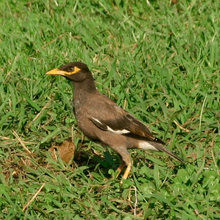Myna
The myna (/ˈmaɪnə/; also spelled mynah) is a bird of the starling family (Sturnidae). This is a group of passerine birds which are native to southern Asia, especially India, Pakistan and Bangladesh . Several species have been introduced to areas like North America, Australia, South Africa, Fiji and New Zealand, especially the common myna which is often regarded as an invasive species. It is often known as "Selarang" and "Teck Meng" in Malay and Chinese respectively in Singapore, due to their high population there.
| Myna | |
|---|---|
 | |
| Bali myna (Leucopsar rothschildi) | |
| Scientific classification | |
| Kingdom: | |
| Phylum: | |
| Class: | |
| Order: | |
| Family: | |
Mynas are not a natural group;[1] instead, the term myna is used for any starling in the Indian subcontinent, regardless of their relationships. This range was colonized twice during the evolution of starlings, first by rather ancestral starlings related to the coleto and Aplonis lineages, and millions of years later by birds related to the common starling and wattled starling's ancestors. These two groups of mynas can be distinguished in the more terrestrial adaptions of the latter, which usually also have less glossy plumage except on the heads and longer tails. The Bali myna which is nearly extinct in the wild is highly distinctive.
Some mynas are considered talking birds, for their ability to reproduce sounds, including human speech, when in captivity.
Myna is derived from the Hindi language mainā which itself is derived from Sanskrit madanā.[2][3] This is called Gataar (ਗਟਾਰ) in Punjabi language.
Characteristics
Mynas are medium-sized passerines with strong feet. Their flight is strong and direct, and they are gregarious. Their preferred habitat is fairly open country, and they eat insects and fruit.
Plumage is typically dark, often brown, although some species have yellow head ornaments. Most species nest in holes.
Some species have become well known for their imitative skills; the common hill myna is one of these.
Species
The following are species of mynas. The coleto and the two Saroglossa starlings are included because of their position in the taxonomic list.
Jungle and hill mynas
- Yellow-faced myna, Mino dumontii
- Golden myna, Mino anais
- Long-tailed myna, Mino kreffti
- Sulawesi myna, Basilornis celebensis
- Helmeted myna, Basilornis galeatus
- Long-crested myna, Basilornis corythaix
- Apo myna, Basilornis miranda
- White-necked myna, Streptocitta albicollis
- Bare-eyed myna, Streptocitta albertinae
- Fiery-browed myna, Enodes erythrophris
- Finch-billed myna, Scissirostrum dubium
- Golden-crested myna, Ampeliceps coronatus
- Common hill myna, Gracula religiosa
- Southern hill myna, Gracula indica
- Enggano hill myna, Gracula enganensis
- Nias hill myna, Gracula robusta
- Sri Lanka hill myna, Gracula ptilogenys
"True" mynas
- Great myna, Acridotheres grandis
- Crested myna, Acridotheres cristatellus
- White-vented myna, Acridotheres javanicus
- Pale-bellied myna, Acridotheres cinereus
- Jungle myna, Acridotheres fuscus
- Collared myna, Acridotheres albocinctus
- Bank myna, Acridotheres ginginianus
- Common myna, Acridotheres tristis
- Bali myna, Leucopsar rothschildi
The following species are often included in the Acridotheres mynas:
- Vinous-breasted starling, Acridotheres burmannicus
- Pied myna, Sturnus contra
- Black-winged starling, Sturnus melanopterus
- Red-billed starling, Sturnus sericeus
- White-cheeked starling, Sturnus cineraceus
References
- Zuccon et al. 2006.
- "myna". Collins English Dictionary - Complete & Unabridged (11th ed.). Retrieved November 22, 2012 – via CollinsDictionary.com.
- "myna". New Oxford American Dictionary.
Sources
- Zuccon, Dario; Cibois, Alice; Pasquet, Eric; Ericson, Per G. P. (2006). "Nuclear and mitochondrial sequence data reveal the major lineages of starlings, mynas and related taxa". Molecular Phylogenetics and Evolution. 41 (2): 333–344. doi:10.1016/j.ympev.2006.05.007. PMID 16806992.CS1 maint: ref=harv (link)
External links
| Wikimedia Commons has media related to Sturnidae. |
- Myna videos on the Internet Bird Collection
- Recording of a Myna bird in Yogyakarta, Indonesia



